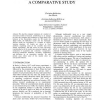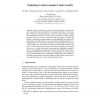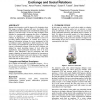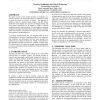1094 search results - page 85 / 219 » On Computing Explanations in Argumentation |
JETAI
2007
14 years 11 months ago
2007
Reasoning, problem solving, indeed the general process of acquiring knowledge, is not an isolated, homogenous affair involving a one agent using a single form of representation, b...
SCHOLARPEDIA
2008
14 years 10 months ago
2008
: We describe computer simulation of a number of associative models of classical conditioning in an attempt to assess the strengths and weaknesses of each model. The behavior of th...
CAV
2009
Springer
15 years 11 months ago
2009
Springer
Abstract. When a model does not satisfy a given specification, a counterexample is produced by the model checker to demonstrate the failure. A user must then examine the counterexa...
HRI
2006
ACM
15 years 5 months ago
2006
ACM
Human-robot interaction could be improved by designing robots that engage in adaptive dialogue with users. An adaptive robot could estimate the information needs of individuals an...
NSPW
2004
ACM
15 years 4 months ago
2004
ACM
We argue in favor of the explicit inclusion of suspicion as a concrete concept to be used in the analysis of audit data in order to guide the search for evidence of misuse. Our ap...




